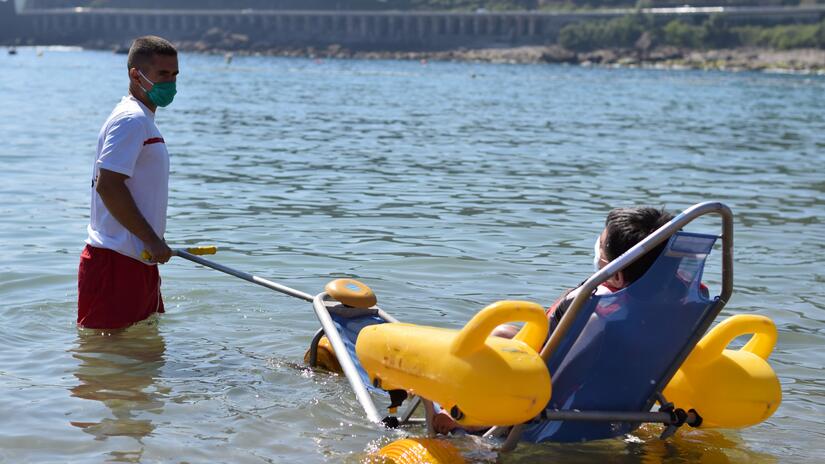Budapest/Geneva, 29 July 2020 – As temperatures soar across Europe, the International Federation of Red Cross and Red Crescent Societies (IFRC) is calling on the public to check on neighbours and loved ones who might struggle to cope with the searing heat.
According to European meteorological offices, France, Greece, Italy, Spain, Switzerland, and Romania can expect temperatures in the mid to high 30s during the week., with Paris and Madrid forecast to reach around 40°C on Friday.
To prevent loss of life, the International Federation of Red Cross and Red Crescent Societies (IFRC) is urging people to check in on their vulnerable neighbours, relatives and friends while following COVID-19 safety measures.
IFRC’s acting health coordinator for Europe, Dr Aneta Trgachevska, said: “Some older people are unable to spend on things like air conditioning. They may be socially isolated. When coupled with thermoregulation problems, reduced water intake and physical ability and chronic diseases, there could potentially be a large at-risk group.”
IFRC is also concerned about the potential compounding impact of COVID-19 during this period of soaring temperatures, said Dr Trgachevska:
“Managing the impact of heat and COVID-19 at the same time poses a challenge to frontline workers, health care systems and local communities. The spread of COVID-19 will not stop in summer. On the contrary, it increases the risk of extreme heat by compromising our usual coping strategies.”
People who would usually visit public places like parks, libraries and shopping malls to find refuge from the heat may be reluctant to leave their homes due to fear of infection. For the same reason, some may be afraid to seek medical care for heat stroke.
“While self-isolation is advisable for vulnerable people during a pandemic, during a heatwave it could be life-threatening, especially for people living alone without home cooling systems. To make sure our loved ones and neighbours stay safe, we should check on them daily via phone or video calls. If you need to physically help someone, make sure to follow hygiene rules, such as wearing a mask and washing your hands upon entering someone’s home,” explains Dr. Trgachevska.
People who are most vulnerable to heat stress are also those most at risk of COVID-19, including people older than 65, pregnant women, those with underlying health conditions, prisoners and marginalized groups such as homeless people and migrants. Due to the pandemic, health workers and first responders are also more prone to heat stress as they need to wear personal protective equipment.
Across Europe, Red Cross and Red Crescent volunteers and staff are on high alert to support communities during summer. The Austrian Red Cross operates cooling centres in malls. It also has a mobile app to help people stay safe with a real time heat map and list of cool public places. In Spain, Red Cross volunteers are helping people with disabilities to enjoy a dip in the sea.
In Monaco, volunteers are regularly checking in on isolated older people via daily phone calls or physically distanced home visits, and in the Netherlands, they go door-to-door to distribute life-saving information. In several other countries, including Italy and the UK, Red Cross teams are reaching out to vulnerable groups to inform them on how to stay protected from both the heat and COVID-19.
Heatwaves can have a catastrophic human toll. In 2003 an estimated 70,000 people died during a record-breaking heatwave in Europe. Climate change is projected to increase the frequency and intensity of heatwaves globally.
Some tips to stay cool and safe:
- Close drapes and shutters during the hottest parts of the day to reduce direct sun exposure
- When it’s cooler outside, open windows on opposite sides of the building to create a cross-breeze
- Avoid cooking food indoors during the hottest hours of the day
- Unplug large electronic devices that produce heat
- Use an electric fan and set a bowl of cold water or ice in front to create a cold breeze
- Wear lightweight, light-coloured and loose-fitting clothes
- Avoid exercise and strenuous activities during the hottest hours of the day
- Drink plenty of cool water, avoid alcohol and caffeine
- Some medicines may reduce tolerance to heat. Get medical advice if you are suffering from a chronic medical condition or taking multiple medications.
- Stay connected, listen to the weather forecast and adapt your plans if necessary
- Follow social distancing guidance when using shared outdoor spaces such as parks and beaches
- Ask for medical help in case of signs of heat-related illness.
Download the heatwave guide developed by the Red Cross Red Crescent climate centre

